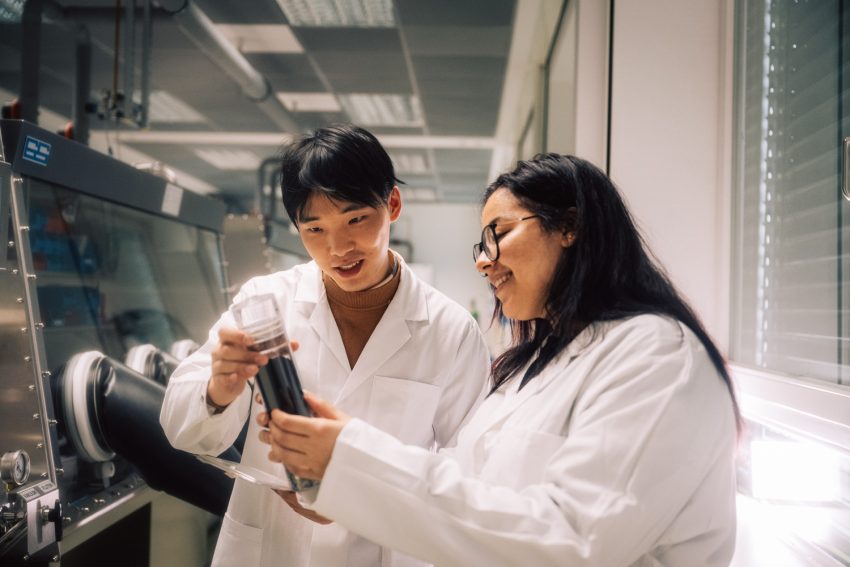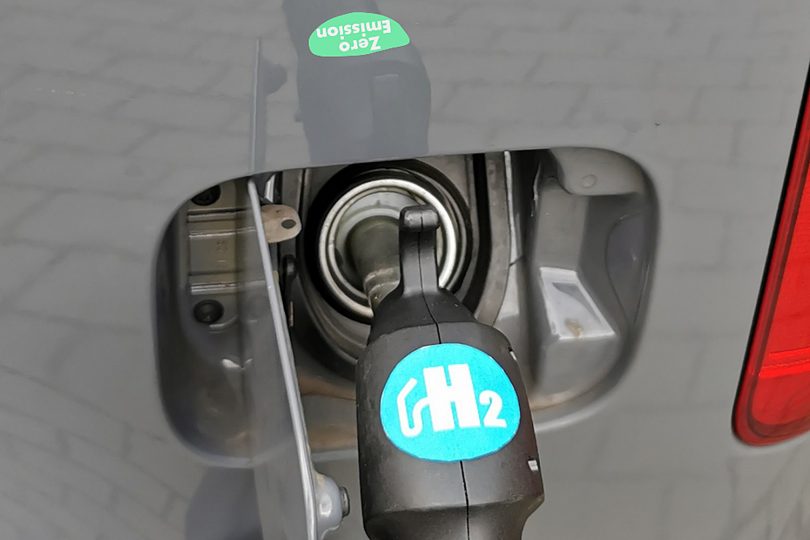Bachelor’s degree programme “Battery and Hydrogen Technology” starts Studying for a sustainable future
The bachelor’s degree programme “Battery and Hydrogen Technology” will start at Technische Universität Braunschweig in the winter semester 2024/25. With its focus on the key technologies of the energy turnaround, it complements the engineering degree programme at TU Braunschweig with an independent, sustainability-oriented profile.

The “Battery and Hydrogen Technology” degree programme focuses on the key technologies of the energy transition.
Photo credits: Giovanna Gahrns/TU Braunschweig/TU Braunschweig
The degree programme, which is part of the Faculty of Mechanical Engineering, offers students the opportunity to study the fundamentals and applications of innovative energy storage technologies from the very first semester. In addition to a sound knowledge of mathematical, scientific and technical principles and process engineering training, students deepen their skills in the application-oriented development of battery systems and hydrogen applications. Fuel cells can be experienced and learned in courses such as “Hydrogen Technologies with Laboratory Hydrogen Escape Room”. Here, students gain practical knowledge of fuel cell operation by solving puzzles. In the “Battery Technologies” lecture, they learn about different types of batteries, such as lithium-ion and solid-state batteries.
Interview with Professor Georg Garnweitner, Dean of Studies at the Faculty of Mechanical Engineering, and Professor Michael Heere, spokesperson for the degree programme:
What special features does Braunschweig have to offer for this course and why should prospective students choose to study battery and hydrogen technology here?
Professor Georg Garnweitner: Thanks to centres such as the Braunschweig LabFactories for Batteries and more (BLB+), TU Braunschweig is a leader in battery research. With the H2 Terminal on the research airport campus, a unique infrastructure for hydrogen technology is also being created here, enabling research at the highest level. We now want to pass on this expertise and the latest research findings to students as part of the Battery and Hydrogen Technology course.
The introduction of the Battery and Hydrogen Technology degree programme coincides with current changes in industry and policy due to the energy transition.
Why is it important to introduce a new degree programme for these new, sustainable technologies?
Professor Georg Garnweitner: The transition to an economy driven by battery and hydrogen technology is particularly profound in the Braunschweig region. There are currently not enough skilled workers on the labour market, which is slowing down the transition considerably. Compared to a traditional mechanical engineering course, knowledge of the relevant technologies and a holistic view of technology assessment are particularly important. The course in Battery and Hydrogen Technology provides these fundamentals right from the bachelor’s degree. Through close cooperation with companies, for example in the automotive and steel industries, students come into contact with companies at an early stage and learn about the challenges and opportunities of this industrial change.
What is special about the degree programme?
Professor Michael Heere: The BWT degree programme has a Hydrogen Escape Room – H2ER – for which an engine test bed at the Institute of Internal Combustion Engines and Fuel Cells (ivb) is currently being converted. As part of a course, students will be able to experience this laboratory in a completely new way. Woven into an “escape room” game, students in small groups can put their practical knowledge of the operation of hydrogen fuel cells to the test.
To whom would you recommend the programme?
Personally, I would recommend the BWT programme to anyone who wants to become an engineer with a focus on climate impact, renewable technologies, the circular economy and, of course, anyone who is interested in batteries and/or hydrogen. But you should also ask yourself: What drives me? This trivial-sounding question cannot be answered with 0 or 1, yes or no. I see many technologies in the field of energy storage, for example the coexistence of batteries and fuel cells and electrochemical systems.
Career entry or master’s programme
Graduates of the bachelor’s degree programme are qualified to enter a wide range of careers, including the development of new battery and hydrogen technologies, technical consultancy for renewable energy companies, and the design and implementation of energy storage systems. After completing the bachelor’s degree, students will have the opportunity to continue their studies in a postgraduate master’s programme in Battery and Hydrogen Technology, which is scheduled to start in the winter semester 2026/27. This will enable students to deepen the knowledge acquired in the bachelor’s programme and at the same time familiarise themselves with the English scientific language.
Interested students have until 15 October 2024 to apply for the bachelor’s programme in “Battery and Hydrogen Technology” starting in the winter semester 2024/25.

Fancy an escape room during your studies? Image credits: Institute of Internal Combustion Engines and Fuel Cells/TU Braunschweig
Fancy an escape room during your studies? The research space station Sagittarius seems to be drifting inexorably towards the black hole of the same name. The power supply on board has failed and the crew, trapped in a remote section of the station, must watch helplessly as their spaceship slowly drifts towards certain doom. As the crew of the space freighter Kronos, you have just arrived at the station’s command centre. The Kronos was only supposed to deliver food, but now it may be the Sagittarons’ last resort. Can you get the power back on and save the crew? The clock is ticking!

